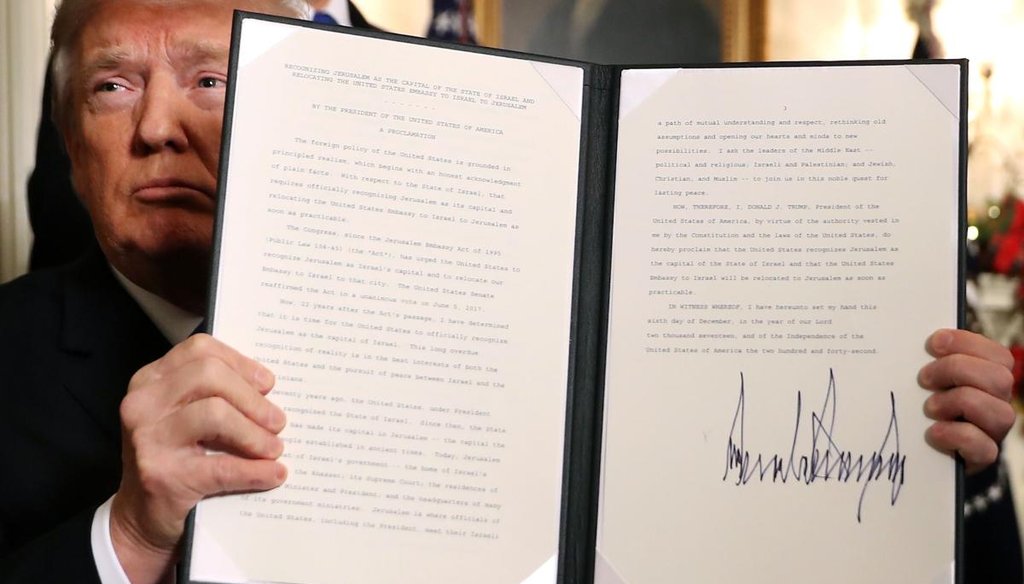Stand up for the facts!
Our only agenda is to publish the truth so you can be an informed participant in democracy.
We need your help.
I would like to contribute
Trump formally recognizes Jerusalem as Israeli capital

U.S. President Donald Trump holds up a proclamation that the U.S. government will formally recognize Jerusalem as the capital of Israel after signing the document in the Diplomatic Reception Room at the White House on Dec. 6, 2017, in Washington. (Getty)
President Donald Trump has taken a major step toward his campaign promise to move the U.S. embassy in Tel Aviv to Jerusalem.
Trump announced the move and formally recognized Jerusalem as Israel's capital in prepared remarks at the White House.
"My announcement today marks the beginning of a new approach to conflict between Israel and the Palestinians," he said Dec. 6.
The policy change stems from a 1995 law mandating the embassy be moved to Jerusalem by 1999. However, out of worry that the move would destabilize peace talks between Israelis and Palestinians, presidents Bill Clinton, George W. Bush and Barack Obama have signed waivers to suspend the move.
"While previous presidents have made this a major campaign promise, they failed to deliver," Trump said. "Today, I am delivering."
Trump said he would direct the State Department to begin preparations for a moving process that will include "hiring architects, engineers and planners, so that a new embassy, when completed, will be a magnificent tribute to peace."
During the first several months of his presidency, it was unclear if Trump would indeed follow through. The White House said on June 1 that Trump had signed a waiver under the Jerusalem Embassy Act to postpone the embassy's relocation. A president must sign the waiver every six months in order to suspend the relocation, a rule that is outlined in the 1995 law.
And during his first trip to Israel as president, he did not announce the embassy relocation, as some had expected he would. This angered Israeli officials.
The pledge looked on hold in October, when Trump said he wanted to first try to make peace between Israel and Palestine before moving the embassy.
During his announcement on the new policy change, Trump said he wanted to make clear it "is not intended, in any way, to reflect a departure from our strong commitment to facilitate a lasting peace agreement."
East Jerusalem, home to some of the holiest sites of Judaism, Christianity and Islam, is disputed territory. Israel annexed East Jerusalem during the 1967 war. The UN Security Council considers Israel's settlements in East Jerusalem to be in violation of international law.
The United States' decision to recognize Jerusalem as Israel's capital sparked protests in Palestine and received praise from Israeli Prime Minister Benjamin Netanyahu.
Trump called for peace and calm in the wake of his announcement.
This is a big step toward his goal. However, until the move to Jerusalem is final, we'll continue to rate this In the Works.
Our Sources
White House, "Statement on the American Embassy in Israel," June 1, 2017
Reuters, "Trump says giving peace a chance before U.S. embassy move to Jerusalem: interview," Oct. 7, 2017
McClatchy, "Israelis angry at Trump's failure to move U.S. embassy to Jerusalem as promised," may 22, 2017
United Nations, "Israel's Settlements Have No Legal Validity, Constitute Flagrant Violation of International Law, Security Council Reaffirms," Dec. 23, 2016
NPR, "How The World Is Reacting To Trump Recognizing Jerusalem As Israel's Capital," Dec. 6, 2017
The New York Times, "Full Video and Transcript: Trump's Speech Recognizing Jerusalem as the Capital of Israel," Dec. 6, 2017
Government Publishing Office, Jerusalem Embassy Act of 1995, Nov. 8, 1995